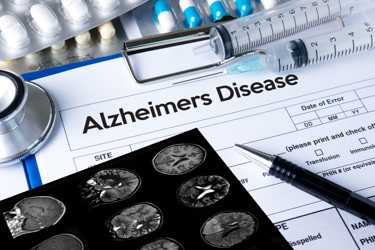Was FDA Wrong? Annovis Bio Shows Strong Data And No Side Effects

By Ed Miseta, Chief Editor, Clinical Leader

Research on Alzheimer’s disease has a disappointing history marked with failed trials and prominent sponsor companies exiting the space. For patients suffering from the disease, the search for a cure continues to yield little good news.
Maria Maccecchini, CEO of drug developer company Annovis Bio, has been working on disorders of the brain, including Parkinson’s disease and Alzheimer’s, for more than 12 years. She believes that experience allows her to see the brain a little differently than others.
“Until about two years ago, I felt no one believed a word I said,” says Maccecchini. “I think some are finally starting to take notice. There are many ways to approach a treatment for these brain disorders, and our approach is different from what has been tried in the past. Our Phase 2 data has shown improved cognition in Alzheimer’s patients and improved speed and coordination in Parkinson’s patients.”
Provide Patients With Dignity

“These are terrible diseases, and we know all of these patients are going to die,” she laments. “We need to give them something that will allow them to live with dignity for whatever time they have left. When my mother became aware of her condition, that was the worst time. Patients become depressed because they realize the world is slipping away from them and there is nothing they can do. If all we do is find a way to keep them stable for an additional five or ten years, they will have a happier existence. Restoring their memory would be wonderful, but just allowing them some dignity prior to death would be a remarkable improvement over what we have today.”
Maccecchini believes the hope for patients lies in early intervention. When you investigate the brain of an Alzheimer’s patient, you see toxic blobs of protein. Researchers felt the blobs were the cause of the disease and that removing the aggregates would allow the brain to function normally.
“Many treatments focus on that manifestation of the condition,” states Maccecchini. “We believe that is the wrong approach. Our therapy, ANVS401, attacks beta amyloid, tau, and alpha-synuclein in the brain. But our approach is focused on looking at how the brain damage starts, which is a new approach to treat neurodegeneration. We want to attack and reverse the cascade of neurotoxic proteins before they begin to aggregate. While other treatments try to remove beta amyloid, our treatment works to lower these levels before they form and impact the patient.”
A Different Approach
Rather than focusing on removing the toxic material, Maccecchini hoped to learn how the cells get injured, what happens when they get injured, and what happens until they eventually die.
“I looked at the sequence of what a cell goes through when it gets injured,” notes Maccecchini. “When the injury occurs, toxic proteins are elevated. We have seen their levels double. At those high levels they cause havoc. First, they impair the information flow. Then cells get sick and are killed, which causes function to slow and eventually go away. We wanted to learn how to influence that process. We started with the same proteins that other pharma companies were looking at. We just started at the other end. Rather than looking at doing something with the proteins, we looked at when they were synthesized at the very beginning, with the hope of making less of them and making them less toxic.”
The small oral molecule therapy under development by Annovis is intended to lower the levels of neurotoxic proteins, improve the information flow, reduce inflammation, and protect nerve cells from dying. In doing so, function is restored.
“There are many advantages to a small molecule treatment for Alzheimer’s,” says Maccecchini. “It’s an oral treatment, so drug delivery is easy. Once we begin to manufacture it, I also believe it will be a very cost-effective treatment. It’s one pill a day with no side effects. I think it will blow other treatment options out of the water.”
Phase 2 data released by the company shows positive results, which were better than even Maccecchini expected.
“Our data shows we were able to improve cognition by 30% in just 25 days,” she states. “That is just unheard of in this space. The improvement in cognition is over placebo and over baseline. That data is real and statistically significant. There's no question about the data. We also found the cells were no longer sluggish. They became more vital, and they would produce more neurotransmitters. Although that one-moth data is exciting, more work will need to be done to see if these improvements will hold up after a year or two.”
The data generated in the Phase 2 trial help to understand the improvements shown by ANVS401. After 25 days, the therapy showed a 4.4 improvement compared to placebo. The Biogen treatment showed a 1.4 improvement over 18 months.
An Alzheimer’s Trail Without Challenges?
Clinical challenges are prevalent in almost every clinical trial. It’s rare that I talk to a clinical executive that can’t rattle off three or four of them with ease. In talking to Maccecchini, she was hard pressed to come up with even one.
“I don’t want to sound cocky, but I really do not see any challenges ahead for our Phase 3 trial,” she says. “Patients are required to take one pill a day. It is a small dose with no side effects. I have also heard great feedback from patients. One Parkinson’s patient emailed me a while back. He was in his second Phase 2 trial and was not seeing any improvement. When that trial concluded he was able to try our treatment in a third Phase 2 trial. After just two weeks he contacted me to tell me that it worked. Several other patients did so as well. They reported better memory, coordination, and attention span with less shaking. We believe we will see similar results in our Phase 3 trial. We will present our data to the FDA in September and plan to start the Phase 3 trials for both Alzheimer’s and Parkinson’s this winter.”
Maccecchini notes the FDA’s decision on Biogen’s Aduhelm was as much a surprise to her as it was to others in the industry. The data and side effects of that treatment have resulted in many professionals questioning the decision. But, with what she now knows about her company’s treatment, as well as one under investigation by Eli Lilly and Company, the decision baffled her.
“For me, that decision is a total mystery that I simply don’t understand,” she says. “The side effects of the Biogen treatment are real. Amyloid-related imaging abnormalities (ARIA) are serious side-effects for patients and nobody can doubt them. They have shown up in every single Biogen study. Lilly is producing a similar treatment but with potentially better outcomes and side effects in a much smaller percentage of patients.”
For Maccecchini the problem is not just the side effects. Biogen performed two concurrent studies. One seemed to show no improvement while the other showed a 22% improvement at a higher dose over the placebo. However, when comparing that to changes reported by patients on the placebo, the net improvement seemed to be a 78% worsening over an 18-month period.
“Those numbers keep rolling around in my head,” she states. “I just can’t seem to come to terms with that.”
Bad News For Future Development?
While the decision is a mystery to Maccecchini, it does cause her to have concerns as well. The negative reaction to the decision was swift and continues to this day, with many believing it was, at best, very lenient. But will that decision now have an impact on future development efforts in Parkinson’s and Alzheimer’s?
“I'm not sure if I should be worried about it or not,” notes Maccecchini. “Does that now mean they will be equally lenient to other treatments in trials? Will I be able to go to FDA with our data and get instant approval? Or will they move in the opposite direction? Will this criticism they received cause them to get cold feet and delay new approvals? I certainly don’t want them to approve everything, but we also don’t want them changing the rules and making it more difficult to get other treatments approved. I pray they don’t get cold feet. Patients and caregivers desperately need better options, and we need someone to step up quickly. Right now, cold feet are the exact opposite of what we need from regulators.”
For Maccecchini, the best news for patients are the new approaches being tried. This is something that hasn’t been seen in past efforts. “The good news for patients is that we are seeing new approaches to Alzheimer's disease,” she adds. “If everyone is working on amyloid, that limits our development efforts. We will never learn anything other than whether that approach has promise for patients. We clearly need different approaches. We now see many small companies coming at this from different angles. Those efforts will give us a better understanding of the brain and hopefully lead to treatments that create better lives for patients.”
